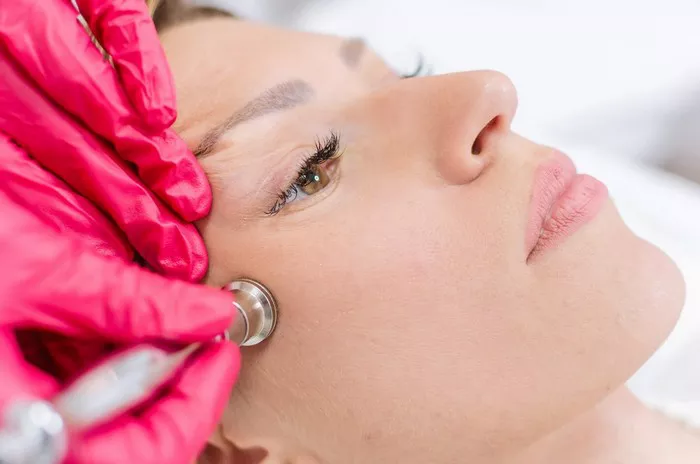Microdermabrasion is a popular skincare treatment that can help to improve the appearance of the skin. The treatment involves using a special device to exfoliate the skin and remove dead skin cells, which can help to reduce the appearance of fine lines and wrinkles, acne scars, and sun damage. One of the most commonly cited benefits of microdermabrasion is that it can make the skin glow. In this article, we will explore the benefits and risks of microdermabrasion and whether or not it can truly make the skin glow.
Microdermabrasion: An Overview
Microdermabrasion is a non-invasive skincare treatment that uses a special device to exfoliate the skin and remove dead skin cells. The device typically uses tiny crystals or a diamond-tipped wand to gently abrade the skin, which can help to reduce the appearance of fine lines and wrinkles, acne scars, and sun damage. Microdermabrasion is typically performed in a spa or dermatologist’s office and can take anywhere from 30 minutes to an hour.
Benefits of Microdermabrasion
Microdermabrasion offers a number of benefits for the skin, including:
Improved skin texture and tone: Microdermabrasion can help to improve the texture and tone of the skin, leaving it looking smoother and more youthful.
Reduced appearance of fine lines and wrinkles: Microdermabrasion can help to reduce the appearance of fine lines and wrinkles, giving the skin a more youthful appearance.
Reduced appearance of acne scars: Microdermabrasion can help to reduce the appearance of acne scars, making the skin look smoother and more even.
Improved circulation: Microdermabrasion can help to improve circulation in the skin, which can help to promote a healthy, glowing complexion.
Minimal downtime: Microdermabrasion is a non-invasive treatment that requires little to no downtime, making it a convenient option for people with busy schedules.
Risks of Microdermabrasion
While microdermabrasion is generally considered safe, there are some risks associated with the treatment, including:
Redness and irritation: Microdermabrasion can cause redness and irritation in the treated area, particularly if the skin is sensitive.
Sun sensitivity: Microdermabrasion can make the skin more sensitive to the sun, so it’s important to wear sunscreen and avoid prolonged sun exposure after the treatment.
Infection: Like any skincare treatment, microdermabrasion carries a risk of infection if proper hygiene practices are not followed.
Scarring: While rare, microdermabrasion can cause scarring in some cases, particularly if the treatment is performed too aggressively or on sensitive skin.
Does Microdermabrasion Make Skin Glow?
One of the most commonly cited benefits of microdermabrasion is that it can make the skin glow. While there is some truth to this claim, it’s important to understand what is meant by “glowing skin” and how microdermabrasion can help to achieve it.
When we talk about “glowing skin,” we are typically referring to skin that looks healthy, radiant, and youthful. This can be achieved through a combination of factors, including good skincare habits, a healthy diet, and regular exercise. Microdermabrasion can help to contribute to this glow by improving the texture and tone of the skin, reducing the appearance of fine lines and wrinkles, and promoting circulation in the skin.
However, it’s important to note that microdermabrasion is not a magic solution for glowing skin. To achieve truly radiant skin, it’s important to take a holistic approach to skincare and overall health. This may include using high-quality skincare products, eating a balanced diet, staying hydrated, getting enough sleep, and managing stress.
Choosing the Right Treatment for Your Needs
Choosing the right treatment for your needs depends on a number of factors, including your skin type, your concerns, and your budget. Here are some tips for choosing the right treatment for your needs:
Talk to a skincare professional: A skincare professional can help you determine if microdermabrasion is a good option for your skin type and concerns.
Consider your budget: Microdermabrasion can vary in cost, so it’s important to consider your budget when choosing a treatment.
Be realistic about your expectations: Microdermabrasion can improve the appearance of the skin, but it may not be able to correct all skin concerns. Be realistic about your expectations for the treatment and discuss your goals with a skincare professional.
Follow aftercare instructions: Microdermabrasion requires aftercare to ensure optimal results. Be sure to follow the aftercare instructions provided by your skincare professional to minimize the risks of complications.
Conclusion
Microdermabrasion is a popular skincare treatment that can help to improve the appearance of the skin. While microdermabrasion can contribute to a healthy, glowing complexion, it’s important to understand that achieving truly radiant skin requires a holistic approach to skincare and overall health. By working with a skincare professional and understanding the benefits and risks of microdermabrasion, you can make an informed decision about whether or not the treatment is right for your needs.

